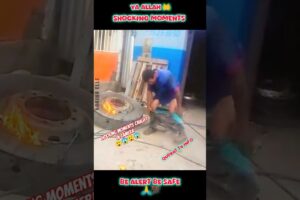
The presence of static electricity where a flammable liquid is being handled or used is an extreme workplace hazard and can lead to explosions and fire.
This video slide show recreates an incident at a workplace in British Columbia where a fuel transfer worker was fatally injured when gasoline vapours were ignited by a spark from static electricity. It shows the importance of having effective bonding and grounding systems in place and the hazards of static electricity onboard fuel tankers, and provides information on industry best practices for fuel tanker loading procedures.
Using animation and photos from an incident site, the video depicts the events that led to the incident, and describes the underlying factors and unsafe practices, and how the lack of an effective health and safety program contributed to the incident. It also emphasizes the importance of adopting effective control measures such as engineering controls to reduce the risk.
Visit our website for more information and resources on workplace safety for fuel transfer and bonding and grounding: https://www.worksafebc.com
View other incident investigation slide shows: https://www.youtube.com/watch?v=s6pXjAentDY&list=PLEA68E77FA552B096
Timestamps:
0:00 Intro to the incident: gasoline vapours ignited during fuel transfer
0:45 How static electricity is generated in fuel tanker hoses
1:14 Bonding and grounding to eliminate static electricity in a fuel delivery system
1:52 Incident recreation
2:58 Top-loading vs. bottom-loading methods and the safety advantages of bottom-loading
3:48 Safe work practices for top-loading and splash-loading
4:18 No way to check grounding and bonding
4:55 Process for fuel transfer
5:14 The components needed to start the fire
5:38 The three likely sources of the static electricity spark
6:27 The explosion and lack of fire control safety system
7:13 The factors contributing to the fire
7:44 Failure of the health and safety program to detect and control the hazard
9:18 Engineering controls required for effective grounding and bonding
__________________________________________________________
We’re working to make a difference in workplace health and safety in British Columbia, Canada. By partnering with workers and employers, we help British Columbians come home from work safe every day.
Subscribe to our channel: https://www.youtube.com/user/WorkSafeBC?sub_confirmation=1
Find us on social media:
Twitter: https://twitter.com/worksafebc
Instagram: https://www.instagram.com/worksafebc
Facebook: https://www.facebook.com/worksafebc
LinkedIn: https://www.linkedin.com/company/worksafebc
Visit our website for the most up-to-date health and safety information and regulatory requirements: https://www.worksafebc.com
#WorkSafeBC #workplacehealthandsafety
Legal terms:
All videos posted by the Workers’ Compensation Board (“WorkSafeBC”) are protected by Canadian and international copyright laws, policies, and treaties. The use of WorkSafeBC videos and other materials is governed by WorkSafeBC’s copyright and trademark statement, available here: https://www.worksafebc.com/en/legal/copyright-and-trademark. Videos cannot be uploaded to other channels without prior permission. If you wish to request permission for use of our videos, please contact us: copyright [at] worksafebc.com
source







Find information and resources on workplace safety for fuel transfer and bonding and grounding here: https://www.worksafebc.com
Im a security in a gatehouse, it is safe to stop those trucks to ask for name of the driver? Everytime i stop them the driver turns the truck off, is that safe? Or do they have to keep going?
Use insulators to make hoses.
Can anyone provide a good SWP for Gasoline unloading
Not the best choice of music at the beginning.
6:50 I don't get it, doesn't the fuel stop flowing when the driver takes his hand off the nosle ?
Crazy after being blown up he was still worried about turning it off.
I do this exact thing for a living and we don’t have any grounding while delivering to customers such as farms.this has given me a lot to think about.
stop playing this sad and depressing music, start throwing some funky beats in there.
I don't care if it's a video about some guy getting his brains smashed out his ears in some freak
accident, most of the time it was their fault anyway. lol 🤣
I wanted to go into hauling petroleum and oil after four years of trucking, but I had no idea about bonding and grounding when transferring fuel. I wonder if these things are taught during training in the US?
I’m confused, was the guy transferring diesel or gas from the rear tanker to the front tanker? They mentioned that he was transferring diesel from one of the tankers to his fuel tank for his tractor but then started talking about gasoline. The tractor this guy had was definitely running on diesel, as I saw that it had an 18-speed manual shifter in the cab. Maybe the tanker trailers he was pulling had different compartments for different fuels? The reason this is confusing is because diesel doesn’t combust easily unless under pressure. I think people say you can even extinguish an open flame with diesel, though I’m not going to test out that claim myself, lol.
Now, I’m scared to fuel up my own Toyota Corolla at the gas station not knowing if the pumps are properly grounded and bonded, lol. Many people and businesses tend to overlook safety if it saves them time and or money. Maybe some gasoline owner did some maintenance and forgot to get one of the pumps bonded and grounded, or the person doing the maintenance didn’t bother to confirm it was bonded and grounded when finishing up?
It’s fascinating that an electrical charge can be built up from mere splashing!!!
what should one do if their current employer is doing the same things that lead to this incident? also the employer happens to be a local government agency
"Safety First" is often all talk
These huge train transport companies should have emergency response plans for each kind of chemical spill, designed for every kind of terrain and catastrophe.
Already in their computer systems ready to be accessed and altered for more exacting responses at their fingertips nearly immediately during the first moments and accessible for any catastrophic problem that may arise.
Along with knowing which of their response teams need to be activated and which Federal, STATE and local governments they may need to immediately get in touch with and activated.
This is no longer the 1800's where they can hide from these dangerous events any longer..
Full visibility, facts, and warnings, along with reaching out for the proper response teams in any area of the country must start immediately without fail, every time.
These types of catastrophes can easily rival NUCLEAR power plant disasters very quickly and can easily have as long lasting and as detrimental effects over just as large areas.
And these effects can also reach around the world within hours to days.
These companies have been in this business for well over one hundred years.
For these companies to act like these disasters of catastrophic proportions are a surprise is ridiculous.
Or like it's a once in a lifetime event they never expected as a possibility is ridiculous.
For them to not be nationally prepared constantly IS A JOKE AND VERY DISRESPECTFUL TO EVERYONE DIRECTLY INVOLVED AND TO ALL AMERICANS IN GENERAL.
IF THIS IS THEIR BUSINESS, IT'S THEIR RESPONSIBILITY AND THE LEAST THAT SHOULD BE EXPECTED OF THEM, IF THEY PLAN TO KEEP DOING BUSINESS ON AMERICAN SOIL, RISING AMERICAN CITIZENS LIVES, LIVELY HOODS, HOMES, AND FUTURES.
THEY SHOULD ALSO HAVE A BILLION DOLLAR OR MORE MINIMUM TRUST AVAILABLE FROM EACH TRAIN TRANSPORT COMPANY AT ALL TIMES. WITH NO EXCEPTIONS READY TO START PAYING FOR ANYTHING NEEDED. And citizen groups from the involved areas must be an important part of knowing and responding to these events at every stage possible from moment one..
This should be a key part of every national train transport company.
Bankruptcy should never be the financial way out for these companies if they are to be in this business with these size and kinds of physical, health and environmental risks while carrying out their everyday business models.
These companies that are having their chemicals transported must also keep these billion dollar trusts for their own responsibilities involved with their chemicals heading in every direction.
After all, these companies that produce, store, and handle these chemicals. Should be the most knowledgeable in every aspect of what kinds of disaster responses would work best in nearly all circumstances.
Much better than train transport companies alone..
There needs to be a multi prong approach to best deal with these events, for best collection, best mitigation and then into the best long term responses continually to be needed.
We need the blame responses, costs and needed actions to come as directly from the parties and companies involved at every level..
OR THESE CHEMICALS SHOULD NOT BE TRANSPORT IN SUCH LARGE QUANTITIES BY ANY COMPANY OR INDIVIDUALS.
AMERICA NEEDS TO START FIXING ALL PROBLEMS AND POSSIBLE CATASTROPHES AT THEIR CORES BEFORE THEY HAPPEN.
AND WHEN NEEDED THEY MUST BE PROPERLY HANDLED FROM THAT POINT FORWARD AS WELL.
WE ONLY HAVE ONE AMERICA AND ONE WORLD.
WE AS A COUNTRY MUST RESPECT AND TAKE CARE OF THESE AS BEST WE CAN.
OTHERWISE WE HAVE NO OTHER PLACE TO HIDE FROM OUR OWN DESTRUCTION.
Now is the proper time to work out these long term solutions.
And every American and especially those effect individual in these events taking place at this time are the best ones to start this forward looking and acting needed structure of organization, rules, laws, trusts, and whatever else is to be needed…
TODAY IS THAT DAY, IN THE FUTURE WE SHOULD BE ABLE TO LOOK BACK TO AS THE EVENT HORIZON THAT WILL FOREVER HELP US WORK TO PROTECT AMERICA AND THE WORLD
I cannot believe they were not using noodles even when I used to work at the Airport when we drove the trucks up to the airplane that very first thing we had to do is hook are grounding cable from our truck to the airplane before we filled it they should have a grounding cable going from that tanker somebody to the other semi and that would have never happened
If I had a fuel delivery service I would lock all the top doors to force the loading to be done from the bottom. I would also require drivers to come to work dressed in their PPE. Violators would be dismissed on the spot.
Thank You so much. I grew up in a commercial industrial construction family business. I knew about static dangers of course but I made assumptions that transfer hoses would auto ground, like plugging in our 10 gauge extension cords. I knew the company color coding that indicated the last date the grounding was check by our safety engineer (my brother). I likely day dreamed during the fuel safety, but I don’t understand how I passed the test. Anyway, great warning for up and coming workers (I’m retired).
this was NOT included in my last TD Cargo coarse
@nicholas regarding EV are not dangerous…In a different respect, they do. Lithium batteries the primary energy source to power EV can be and are extremely difficult to extinguish during a fire event, for example, a breach of battery cell compartment due to an accident may result in an Immedient quick moving uncontrollable fire. Although they're safety precautions in place to minimize such an event it can happen and has, and it's worth noting, water should never be used in an attempt to extinguish an EV fire where the battery cell compartment is involved. Although static electricity for the most part isn't a Hugh factor in respect to an EV, nothing is 100% safe (not dangerous) especially when the human factor is involved. Be it fueling a tanker, transferring of ANY fuel type, petroleum base products (large or small) or simply fueling your Pov, be aware of potential hazards to minimize injury, use common sense, focus on the task at hand so as not to be distracted. For those that do pull into a filling station to fuel your gas vehicle, a good practice to follow prior to filling vehicles tank, locate the emergency shut off for gas/diesel pumps, these are clearing marked which is a large push button that's red in color to depress in an emergency to immediately shut fuel flow off. Also, locate fire extinguishers that are placed throughout the area where fuel is dispense. Lasty, prior to getting back into your vehicle, glance at fuel nozzle that it's securely returned, and hose is clear from any obstruction catching onto vehicle upon leaving station…
With every advancement, there is advanced upkeep. Sad that we still have to learn things the hard way before necessary change can be implemented to operate our modern world.
Yeah,but with bottom off loading you have to worry about the head pressure of what your filling.I don't ever like pressuring fuel period,any kind of fuel..so I see why he did this and how it happened. I am lucky.